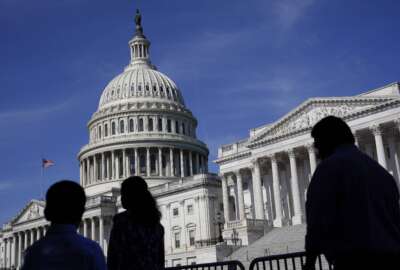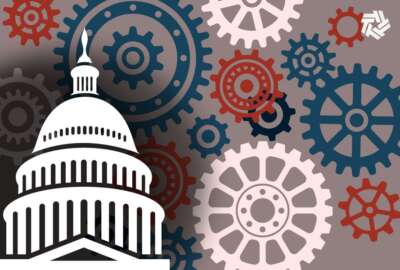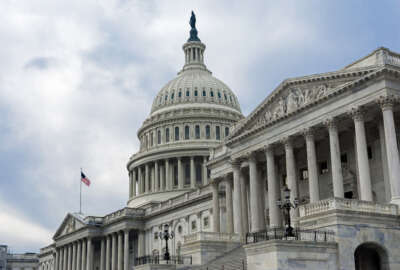Congress returns to town — and we hope that’s a good thing
Congress is back in town this week. However, the big question is whether the House and Senate can agree on a continuing resolution by Sept. 30.
With only a couple of weeks worth of working days left before the end of the fiscal year, Congress is back in town this week. However, the big question is whether the House and Senate can agree on a continuing resolution by Sept. 30 and avoid a lapse in appropriations. WTOP Capitol Hill correspondent Mitchell Miller joined the Federal Drive with Tom Temin to discuss the possible scenarios.
Interview transcript:
Tom Temin: And there are a lot of them, aren’t there Mitchell?
Mitchell Miller: There really are. As Congress returns, we return to more political drama, right? So now we have House Speaker Mike Johnson’s bill to avoid a government shutdown, a short-term spending plan which Republicans usually oppose, but in this case, as you noted, they only have until the end of the month, so only a few weeks left, and there’s really little time to waste. So his plan would extend funding through March of next year and it would also include the Save Act, which is a Republican measure that would require proof of citizenship to vote in a federal election. Now, Democrats say it’s not needed since federal law already makes it a felony for noncitizens to vote in federal elections. But Republicans point to various states where noncitizens are allowed to vote in local and state elections. They feel like this is a slippery slope, and frankly, they also just think it’s a good election issue as we head toward Nov. 5 and they want to raise this up. Former President Trump also supports it. So it’s unclear if this continuing resolution, with this Save Act included, can pass the House. The Save Act actually passed earlier in the year in the house on its own, but even if it does, it would die in the Senate. So what we’re going to be looking at is that familiar scenario where conservatives are pushing House Speaker Mike Johnson to put this on the floor and see if it can pass. And then there’s some other Republicans who really don’t want to get into a scenario where we might be looking at a possible government shutdown a few weeks before the end of the month, and then, of course, not long before the election. So we’ll have to see what happens here. I think the most likely scenario if it does not pass is that they would come up with a more quote, unquote, traditional short-term spending plan that we’ve seen many times before, extending into the months, into the lame duck session after the election, and then they would try to get everything worked out in an omnibus before the holidays. So it’s possible we could get to that scenario too. We’ll just have to see how things unfold initially at least this week.
Tom Temin: Right. And anything they do come up with, of course, the president has to sign.
Mitchell Miller: Right.
Tom Temin: And so it would have to be to the White House liking.
Mitchell Miller: Exactly. And then that gets more complicated too because, of course, we’re again heading to the election. What is the White House willing to accept. The Republicans, for their part, the reason they want to go into March is because they feel like, if former President Trump is elected to the White House, that they would then be allowed to sort of scrap all the things that are included in what would normally just extend into this next fiscal year and they could get a fresh start. But there is also the issue, as I mentioned, about this threat of even just mentioning a shutdown, even if it doesn’t happen. A lot of nervous lawmakers don’t want that circling around in the air right before Election Day.
Tom Temin: And short of a continuing resolution that goes until Sept. 30 of 2025 they still at some point have to do an appropriations, either an omnibus or the 12 bills.
Mitchell Miller: Right exactly because the house has only passed five appropriations bills and the Senate has passed none, although they did get them out of committee. So they still have a ton of work to do before this all gets wrapped up. So we’re in kind of a familiar situation. It just happens to be in an election year.
Tom Temin: I can see the next bumper sticker in Washington: ‘Pass Bills, Not Gas.’
Mitchell Miller: Certainly, could be.
Tom Temin: All right. And then what’s in the midst of all this, the status of the federal 2% pay hike.
Mitchell Miller: Right. So the feds are going to get a 2% federal pay raise for the next fiscal year. President Biden recently announcing that, but it won’t become official, of course, until he actually signs an executive order. But this would be as many federal workers already know. It would be the smallest annual raise enacted during the Biden administration. Really comes down to about 1.7% across the board and then you get the 0.3% pay adjustment. That compares to 2024 when there was more than a 5% pay increase. So this is obviously getting a lot of pushback and complaints from federal unions who just don’t think it goes high enough. And again, as happens virtually every year, Virginia Congressman Gerry Connolly, earlier in the year, reintroduced his FAIR Act, the Federal Adjustment of Income Rates Act that would give Feds a much larger raise in his case, more than 7%. But as it has in the past, it’s likely just to fall to the wayside and it looks like this 2% one is going to go into effect.
Tom Temin: We’re speaking with Mitchell Miller, Capitol Hill correspondent for WTOP, and still on the budget front, the Veterans Affairs Department says it’s running out of money and they need Congress to act by Sept. 20, not the 30th, right?
Mitchell Miller: And some people say this is actually, at least right now, a bigger issue ahead of Congress because that deadline is even more close than the other one and it’s a really interesting situation. The Department of Veterans Affairs this summer indicated that it needs that it has a shortfall of close to $3 billion for operations and then an additional $12 billion more is needed to account for increased payments for benefits and that type of thing. This is a big warning from the VA. But then Republicans have really complained and blasted VA leaders, saying that this is the result of poor management, that they shouldn’t be coming hat in hand at the last minute like this. So that is going to have to be worked out very quickly, obviously later this month. And I think this week, we’re going to see a lot of discussion about this because there is a hearing before the House Veterans Affairs Committee in connection with VA management. And you can be sure there is going to be a lot of give and take on this issue when that comes up later this week.
Tom Temin: Well, it’s hard to calculate I guess when new benefits keep getting enacted and more and more people coming into these programs say under the Pact Act for the burn pit and so forth and they expand it. It’s hard to predict what their costs will be, I guess.
Mitchell Miller: Yeah, exactly. And that’s what the VA is saying. It’s trying to track the money as best it can. But as you mentioned, you have all these different changes in programs and expansions, and it’s just very, very difficult to see exactly how much money they are going to need. And of course, they already get a lot of complaints from lawmakers about asking for too much money. So in this case, they tried to be on the conservative side and now we have this political situation.
Tom Temin: And people can’t quite vote yet in the 2028 election. But for 2024, the mail ballots are starting in some places, even as we speak. And that brings up the topic of whether the Postal Service is up to the task here.
Mitchell Miller: Right. And there was a red flare that went up last week in Virginia. The Commissioner of Elections, Susan Beals, was meeting with state lawmakers and she said she was worried that the U.S. Postal Service wasn’t going to be able to do the job it needed to do in Virginia. And she said that many people think that they put their ballot in five days before the election day it’s going to get there. She says she doesn’t think that the Postal Service can guarantee that. Now, the Postal Service has said that it has beefed things up, that it’s ready to go for a full election season. There was a statement to congressional committees. But this is an issue that has been swirling around, as you know, Capitol Hill for a long time. And many times, when I talk to Virginia Sen. Tim Kaine and Virginia Sen. Mark Warner, one of the biggest complaints that they get from constituents is about the mail. And particularly in the Richmond area, there’s been a lot of problems with mail not getting delivered at all or being delivered very, very late. So we’ll have to see whether or not the Postal Service is up to it. They say that they are. They also point to the primary season when things went fairly smoothly. But of course, the primaries are much smaller than a nationwide national election.
Tom Temin: Yes, and you can drop things in a single dropping spot like ballots and if they’re going to different areas, then you have no idea whether it’s going to get there. One of these days, I’ll tell you the story of my daughter’s wedding invitations, which they didn’t all get to their destination.
Mitchell Miller: Yeah, and as everybody has seen either personally or in these regulatory committee hearings, the processing centers is often where they get stuck, and the Postal Service has been trying to address that problem, but it still happens quite a bit.
Tom Temin: All right. And then the Postal Service is making more friends by bringing back the holiday surcharge.
Mitchell Miller: That’s right. So the holiday surcharge, they are looking to increase prices for a variety of services starting in October, specifically Oct. 6. Then this would go into next year and this was actually dropped the previous year in an effort to try to compete better against UPS, FedEx and Amazon. But recently, the Postal Service announced that it will raise these prices for a variety of things. For example, Priority Mail Express will go up about 5% similarly for priority mail and a larger almost 6.5% increase for USPS ground advantage and then others will stay the same. But again, this is part of the effort of the Postal Service to kind of try to balance all these things and try to bring in a little bit more revenue. Frankly, the revenue that this is going to bring in is just a drop in the bucket compared to the overall revenue, but revenue has been rising very slightly for the Postal Service. Obviously, that’s not necessarily going to be people that are paying more when they go to the post office to send out their holiday packages.
Tom Temin: Yeah, so sending that awkward family photo in a frame is going to cost you more.
Mitchell Miller: Exactly.
Copyright © 2025 Federal News Network. All rights reserved. This website is not intended for users located within the European Economic Area.
Tom Temin is host of the Federal Drive and has been providing insight on federal technology and management issues for more than 30 years.
Follow @tteminWFED






